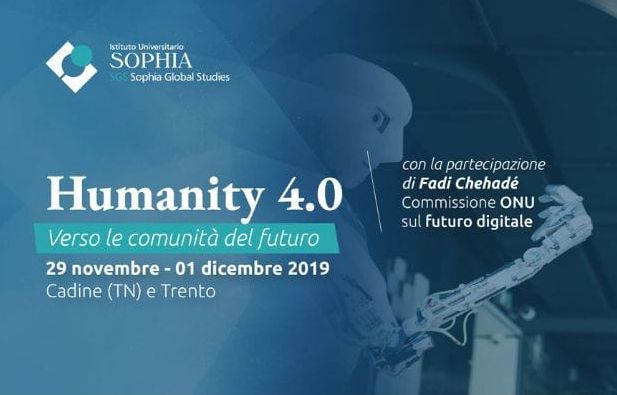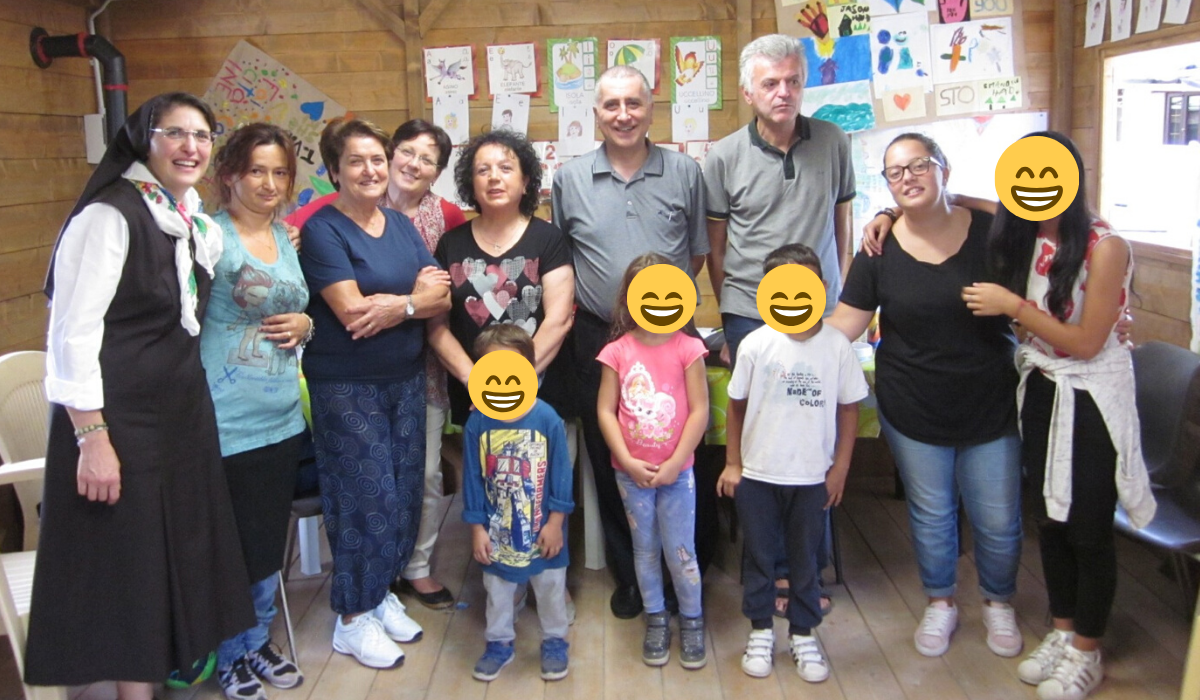
Workshop
Chiara Lubich – Love Conquers All: “Chiara makes us fly high”
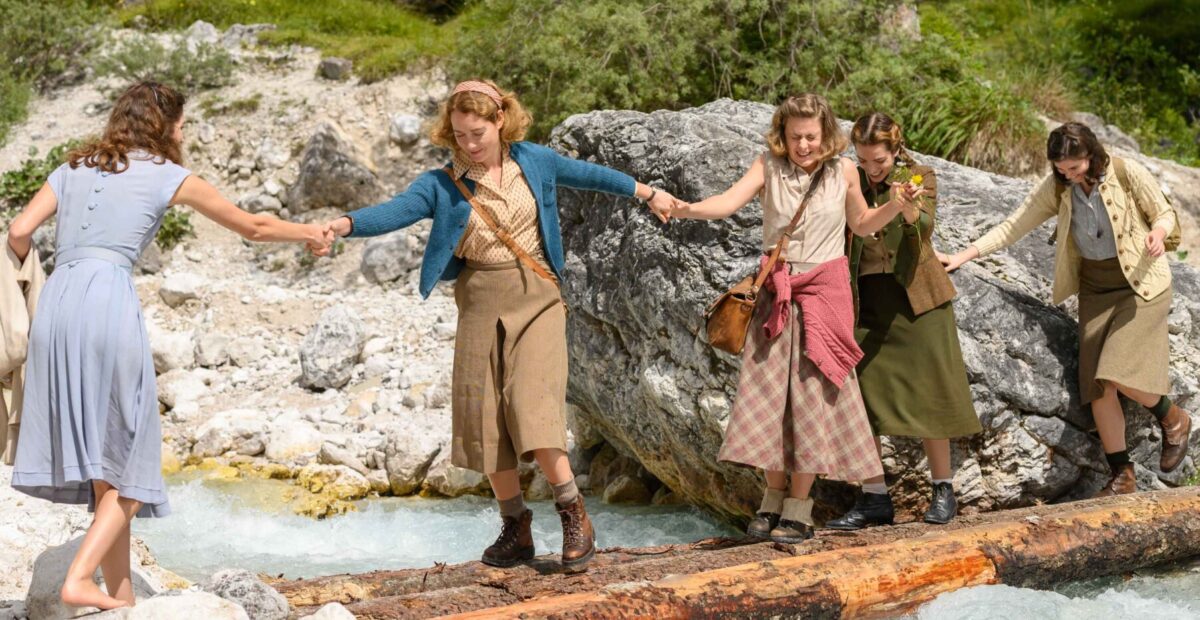
Anita Martinez, journalist from the United World Project, has interviewed Saverio D’Ercole, creative producer from Eliseo Multimedia which, with RAI Fiction, has produced a TV movie on the life of Chiara Lubich, foundress of the Focolare Movement. With her efforts in favor of fraternity and her contribution to the spreading of a culture of unity and peace, Chiara is one of the main inspirations of the United World Project and of this observation platform on fraternity. The film will air in prime time on RAI 1, the Italian public broadcasting channel, on 3 January 2021.
Saverio D’Ercole confides to us that working on a film about Chiara had been a bit of a dream come true. “I got to know Chiara Lubich when I was 11 years old. I heard her story being told a thousand times and every time I was completely enchanted. The older I got, the more I heard it and the more, perhaps because of my love for the cinema, I would imagine it and picture the scenes.” Born fifty years ago in the Italian city of Matera with its famous ancient cave dwellings that provided the backdrop for many famous films, such as The Gospel According to Matthew (1964) by Pier Paolo Pasolini or more recently The Passion (2002), Nativity (2006), Wonder Woman (2017), or the upcoming 007 No time to die, he had been in love with cinema from a very early age. After attending several schools of theater and completing the DAMS graduate course of the Arts, Music and Show at the University of Bologna, he began his acting career in Rome and collaborated with the Lux Vide television productions (1996). Later he worked with the Casanova Multimedia (2010) and now Eliseo Multimedia. As editorial director and creative producer, he has to his credit forty projects in film and TV series, including: War and Peace, Coco Chanel, Saint Augustine, Adriano Olivetti, Mennea, La strada di casa, and Io sono Mia. Saverio has belonged to NetOne ever since its founding in 2000, which is engaged in bringing the culture of unity into the world of the media. He has been married for 23 years to Giovanna and has four sons between the ages of 14 and 22.
Saverio, Chiara Lubich is the one who inspired the idea of a united world upon which our United World Project is founded. Why make a film about her and why now?
“The idea of the film took shape when the Italian public television announced that it was looking for stories about women who had left a mark on Italy’s history. We thought that this was the right moment for proposing Chiara’s story. As soon as we began discussing it with them, it immediately became obvious how relevant the topic of interreligious dialogue is to the times we are living in, because of the many situations that we are all unfortunately aware of. And this immediately captured their attention. We began work on the film around four years ago, in 2017. We thought about how to organize the story with the authors, and so on . . . We identified the first years of Chiara’s story as the best ones to tell, the years during which she made her choice and the Focolare Movement began. We never imagined that we’d be rolling the film in this terrible year for so many reasons, with the pandemic that minimized our certainty. I have to say that while we were making this film last summer was already of great relevance, we felt that the power of the story that we were telling with its message of universal fraternity, was becoming even more powerful. The uncertainty that is found in all of us and everywhere in the world because of the pandemic is very similar to that uncertainty about the future that Chiara and her first companions experienced in those years. So, we can say that her story was relevant to begin with, but the pandemic makes it even more relevant. I like to quote my boss, producer Luca Barbareschi, who says; ‘In some parts of the world they are beginning to vaccinate against the Corona Virus. For me, this film on Chiara is like vaccine for the soul.’”
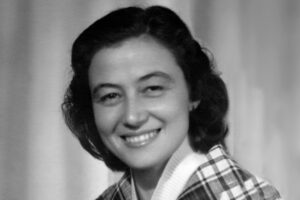
At times, nowadays, one takes for granted that the leader of a religious movement is a woman, without a family; instead, if we go back to those times, in that context, it was rare. How do you think the director and the main character were able to bring this out in the film?
“First of all, I have to say that both the writers, Francesco Arlach, Luisa Cotta Ramosino, Lea Tafuri, and then the director Giacomo Campiotti, and Cristina Capotondi, the actress who plays Chiara, did an extraordinary job. What emerges in the film is the encounter between the artistic dimension and each of these components. Some may have heard about Chiara. Some had known the Focolare Movement in some way, but none of them had so to say frequented the Focolare. And then we had tried to protect this aspect, because we wanted it to be a film that could speak to everyone. Their approach rendered the story universal. Certainly, you are perfectly correct in remembering that in those days, a woman who doesn’t become a nun, but stays in the midst of the world, was an absolute novelty. We can say with good reason that she was revolutionary for her time. A girl of 23 years together with some friends, more or less her peers, who all decide to pursue their dream of a united world, in a moment when the world was exploding with hate, and they do it, this is the point, as women. They go off to live alone, and this in itself was scandalous in the Italian province at that time. But they didn’t allow themselves to be stopped, because they knew that the ideals they brought were stronger than everything. They believed that, and the results are now there for all to see.”
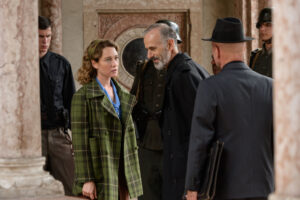
In your opinion, Saverio, could Chiara Lubich be a feasible model of womanhood for today’s young people? Could she still be as fascinating as she was to her friends in those days, for example?
“Absolutely yes, but for a very simple reason. Because Chiara makes us fly high. There is aspiration, dreaming, courage, passion and simplicity in the story of Chiara. Chiara is someone who set her heart upon a dream – which drew from the faith . . . in the Gospel . . . that’s her story – and she fought for that dream! All that aspiration, that idealism then produced fruits, because now the Focolare Movement which she founded spread across 180 countries. It’s beautiful to watch in the film how they seem like five little girls who don’t even realize what they are founding. But it is the power of their strength, their passion, their radicalness in this dream, in this ideal, that led them to do something incredible. So, any young person searching in their own lives for a great ideal, a powerful ideal, cannot but see themselves in this story.”
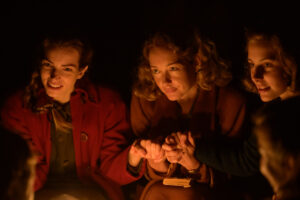 Chiara Lubich – foto di Federica Di Benedetto
Chiara Lubich – foto di Federica Di Benedetto
Another thing that came out in the trailers that have been showing recently is that Chiara’s brother, Gino Lubich, has a very different view on things from his sister. Yet, they always supported and accompanied one another. What can this tell us in this age of polarization?
“Meanwhile, it must be said that there was great love and affection between Chiara and Gino. Naturally, with her other siblings as well. But, with Gino there was a special friendship. He was a medical student and was drawn into the war, first as a medic and then in the horror of the bombings in reaction to Nazism. At that time, he was a nonbeliever or at least had doubts about the faith, and had joined the partisans to fight for Italy’s liberation and for a better future. Here is the objective that united Gino and Chiara in some way– a better future. Gino, however, tried to follow his own path. Chiara used a completely opposite strategy, of peace and of love. Now we can say that Chiara had been prophetic, in the sense that she became more and more aware that the only key that can possibly lead to fraternity is love and that the key of violence never leads us anywhere. What is very important that I’d like to recall from one scene in the film (that won’t spoil the film) is forgiveness. Because there is no future without forgiveness. This is the other relevant content in this story: You cannot look to the future if you don’t reconcile. And Gino’s role in this scene will be quite important, thanks to his relationship with Chiara.”
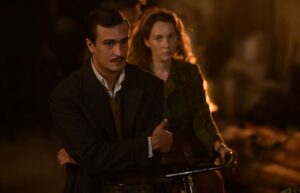 Chiara Lubich – foto di Federica Di Benedetto
Chiara Lubich – foto di Federica Di Benedetto
Another thing that seems beautiful to me is how the film shows that the main actor, Chiara, isn’t alone, but has friends with her. You could say then that this film is also about friendship? How important were her friends and what part did they play in her story?
“Absolutely, yes. Look, it is precisely that, a story about a friendship that was based on different values that were not only sentimental. It is a friendship that is built on sturdier values. Which also went through moments of misunderstanding, because, in my opinion, another small merit of the story is that it doesn’t give any discounts. It doesn’t only tell the positive things. There is a moment of conflict that is created within the group, but I won’t say more in order not to reveal too much. But, in that moment of even bitter confrontation, a real and true fight, it is a phase of the friendship, a passage that acquires meaning in the moment that the friendship is real.
And so there is a return for us to this story, that makes us realize how the strong experiences that touch us so deeply in the moment we live them, remain with us for life.”
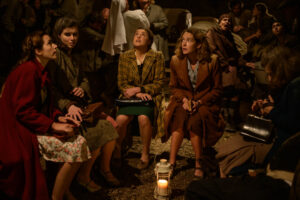
And so, I’d like to know how it was in the end, to work on this film, and what would you tell a young person who wanted to work in the field of cinema today, perhaps with an interest in these ideals of fraternity. . .
“How it was for me is very complex to explain in a few minutes, because I knew Chiara when I was 11 and 12 years old. And so, I heard her story thousands of times, and every time I heard it, I was completely enchanted. And the more I grew and the more I heard it, perhaps because of my love for the cinema, it led me to imagine the scenes. So I can say that I also realized a dream. This is a huge gift that I feel that I have been given. Because living these four years of building this project, which had to overcome many difficulties like, for example, the pandemic – my society was running the risk of closing down in March and we didn’t know if we’d be capable of reopening and finish the film. So, for me it meant I had to do my part, that is, to be an instrument so that all could happen in accordance with the direction that Heaven wanted. Because I believe that Chiara from above somehow constructed this film. So, yes, it was a totally unique professional experience. In my 24 years of work, certainly the project that I have most at heart, it couldn’t be otherwise, because it is something that touches me in such a deep place within me. One special moment, among the many others that I experienced, was when the director called all the actresses and actors on stage – the studios from my society are inside a theater – on the main stage of this theater. There were tables set up and, all around, there were the actors with the director. The curtain was open, the lights were turned on for the first reading of the script. There was a sacred silence. Then, the actors and actresses began to recite the lines of the scenes. There is where the miracle occurred. I was really moved, because I felt my heart beating, I felt myself breathing in this story, and it didn’t seem like it was really happening for me.
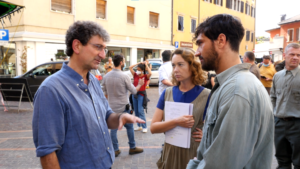
One special moment, among the many others that I experienced, was when the director called all the actresses and actors on stage – the studios from my society are inside a theater – on the main stage of this theater. There were tables set up and, all around, there were the actors with the director. The curtain was open, the lights were turned on for the first reading of the script. There was a sacred silence. Then, the actors and actresses began to recite the lines of the scenes. There is where the miracle occurred. I was really moved, because I felt my heart beating, I felt myself breathing in this story, and it didn’t seem like it was really happening for me.
Then you ask me what to tell a young person who would like to work in this field. Look, this might sound boring, I might sound boring for my sons who might watch this video. But, that’s the way it is: You have to study. If we are called in life as persons to keep on improving, always improving, in our professional life we have to have the will to be the best, but not for our own vainglory, not because of vain ambition, not to make money, but simply so that our talent might be able to express itself in beautiful things; to be able to truly work for the building of a more united world, for universal fraternity, with intelligence. So, what I can tell you is: Study!”


